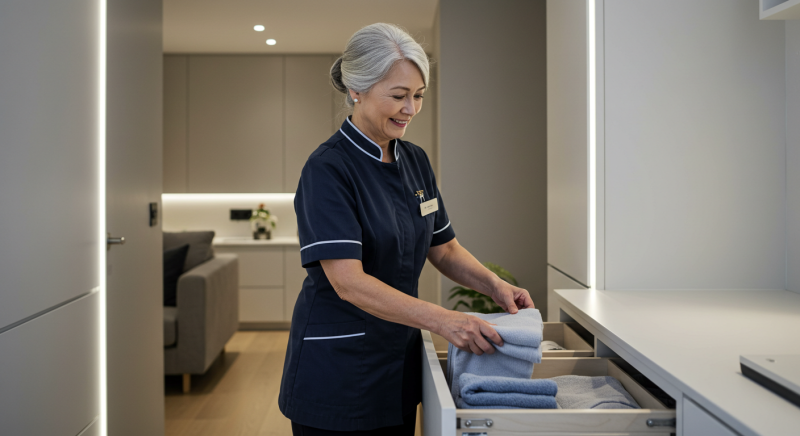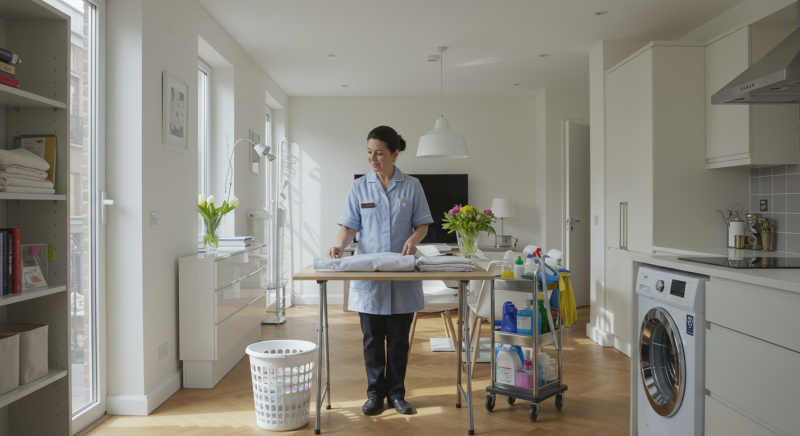Are You Moving to the UK? Here’s How to Land a Cleaning Job
The UK’s cleaning sector is booming, offering stable employment, competitive salaries, and even visa sponsorship for international workers. Whether you’re seeking part-time flexibility or a full-time career, cleaning jobs in the UK provide a practical entry point for newcomers. This guide explores 15 roles, their requirements, salaries, and actionable steps to secure these opportunities.
Key Takeaways
- High Demand: Over 2,300 domestic and commercial cleaning roles are currently listed in the UK, with hospitals, schools, and households driving demand.
- Visa Options: Skilled Worker and Health and Care visas are common pathways for foreign applicants.
- Salary Range: Hourly wages range from £9.50 for entry-level roles to £24 for specialized positions.
- No Experience Needed: Many roles require only basic English proficiency and reliability.

The UK Cleaning Job Market: A Gateway for Newcomers
The UK cleaning sector has evolved into a thriving landscape for newcomers, particularly those seeking stability and a straightforward entry into the workforce. With over 1.2 million people employed in cleaning and maintenance roles nationwide, this industry is not just surviving—it’s expanding rapidly. Post-pandemic shifts, including heightened hygiene standards and a surge in demand across healthcare, hospitality, and corporate sectors, have cemented cleaning jobs in the UK as a cornerstone of the labor market. For international arrivals, these roles offer more than just employment; they provide a structured pathway to financial independence, skill development, and even long-term residency.
One of the most compelling aspects of cleaning jobs in the UK is their accessibility. Unlike many professions, formal qualifications are rarely mandatory. Employers prioritize traits like reliability, attention to detail, and basic English communication skills, making these roles ideal for newcomers still adapting to the country. Training is often provided on-site, with many companies offering certifications in health and safety or chemical handling to enhance employability. This low barrier to entry, combined with the sector’s 8% annual growth rate, creates a rare opportunity for those starting fresh in the UK.
Visa sponsorship further sweetens the deal. The UK’s Skilled Worker Visa and Health and Care Visa are frequently utilized by employers to recruit international talent for cleaning roles, especially in high-demand areas like hospital sanitation and elderly care. For example, NHS Trusts and private healthcare providers actively sponsor overseas workers to fill critical gaps in their cleaning teams. Similarly, commercial cleaning firms servicing airports, office complexes, and educational institutions often partner with immigration advisors to streamline the hiring process for non-UK residents.
Salaries in the cleaning sector vary by role and location but remain competitive. Entry-level positions, such as domestic cleaners or school janitors, start at £9.50–£12 per hour, while specialized roles like biohazard cleaners or industrial machinery sanitizers can command up to £24 hourly. Regional differences also play a role: cleaners in London and the Southeast typically earn 10–15% more than those in Northern England or Scotland, reflecting the higher cost of living. For newcomers, these wages provide a solid foundation to cover relocation costs, save, or pursue further qualifications.
Beyond immediate financial benefits, cleaning jobs in the UK offer surprising career mobility. Many workers transition into supervisory roles, quality control, or even start their own cleaning businesses within a few years. Employers like Mitie and ISS Facility Services frequently promote from within, offering leadership training and mentorship programs. For those eyeing long-term settlement, consistent employment in this sector strengthens residency applications, demonstrating contribution to the UK economy.
The market’s resilience is another draw. Unlike seasonal industries, cleaning jobs in the UK remain steady year-round, with spikes in demand during winter (due to deep-cleaning contracts) and summer (for hospitality and event cleaning). This predictability allows newcomers to plan finances and career moves with confidence.
In essence, the UK cleaning job market isn’t just about mopping floors or wiping surfaces—it’s a dynamic, inclusive industry where hard work translates to tangible rewards. For newcomers, it’s a pragmatic first step toward building a secure, fulfilling life in the UK.
15 Cleaning Jobs in the UK for Newcomers
1. Hospital Cleaner
Requirements: Basic English, health and safety awareness.
Salary: £9.50–£11/hour.
Hospitals like those partnered with The Best Connection Employment Group hire cleaners to sanitize patient rooms and operating theatres. Visa sponsorship is often available, with relocation support for eligible candidates.
2. Domestic Housekeeper
Requirements: Reliability, flexibility in hours.
Salary: £12–£15/hour.
Private households in areas like London and Harrogate seek part-time housekeepers for tasks like vacuuming, laundry, and organizing. Agencies like Little Ones UK Ltd list roles with hourly rates up to £22.
3. Commercial Office Cleaner
Requirements: Experience with industrial equipment.
Salary: £10–£12.50/hour.
Companies like Compass Group hire cleaners for offices and schools, offering stable contracts and occasional overtime pay.
4. After-School Nanny
Requirements: Basic childcare experience, valid DBS check, and flexibility for school hours.
Salary: £15–£25/hour in cities like London and Surrey.
After-school nannies support families by picking up children from school, assisting with homework, and organizing activities. Agencies like Little Ones UK Ltd often list roles requiring 3–5 hours daily, with some positions offering visa sponsorship for international applicants with childcare certifications.
5. Train Cleaner
Requirements: Comfort using industrial equipment (e.g., CET machines), physical stamina for night shifts.
Salary: £12.60/hour in Hull, with overtime opportunities.
Train cleaners sanitize carriages, empty bins, and disinfect restrooms. Employers like The Recruitment Co hire for roles that may include travel, with visa sponsorship available through agencies like Staffline.
6. Industrial Warehouse Cleaner
Requirements: Experience with heavy machinery, health and safety training.
Salary: £12.21–£14.50/hour, with higher rates for night shifts.
These cleaners maintain factories and warehouses, often working for firms like Sodexo. Roles include sanitizing production areas and handling industrial waste, with visa pathways for unskilled workers.
7. School Cleaner
Requirements: Basic English, reliability for term-time schedules.
Salary: £12.60/hour in schools like Ysgol Pen Y Garth.
School cleaners ensure classrooms and common areas meet hygiene standards. Employers like Compass Group offer part-time roles, ideal for newcomers seeking stable hours.

8. Domestic Housekeeper
Requirements: Organizational skills, ability to multitask (cleaning, laundry, meal prep).
Salary: £12–£22/hour in affluent areas like Harrogate and Belgravia.
Private households hire housekeepers for tasks like organizing spaces and managing daily chores. Agencies such as Little Ones UK Ltd connect candidates with families, occasionally offering visa support.
9. Commercial Office Cleaner
Requirements: Experience with floor buffers, vacuuming, and restocking supplies.
Salary: £10–£12.50/hour, with benefits like paid holidays.
These cleaners maintain corporate offices, often through firms like Lyng Hall School. Roles may include evening shifts, with visa sponsorship for eligible candidates.
10. Hotel Housekeeper
Requirements: Attention to detail for room turnovers, laundry management.
Salary: £23,809 annually (approx. £12/hour) at locations like Stadium MK.
Hotel housekeepers ensure guest rooms meet hygiene standards. Some employers provide training and visa assistance for roles in high-demand tourist areas.
11. Self-Employed Domestic Cleaner
Requirements: Self-motivation, ability to manage client schedules.
Salary: £14/hour in regions like Shropshire.
Platforms like Diamond Home Support connect cleaners with clients. While visa sponsorship is rare, this role suits those on student visas with limited work hours.
12. Janitorial Staff
Requirements: Basic maintenance skills, knowledge of cleaning chemicals.
Salary: £9.50–£12/hour in schools and public facilities.
Janitors handle repairs and sanitation in buildings like hospitals. Employers like NHS Trusts prioritize reliability over formal qualifications.
13. Biohazard Cleaner
Requirements: Certification in hazardous waste handling, PPE training.
Salary: Up to £24/hour for specialized sanitation roles.
These cleaners decontaminate high-risk areas in healthcare settings. Training is often provided on-site, with visa sponsorship through healthcare recruiters.
14. Healthcare Facility Cleaner
Requirements: Infection control knowledge, flexibility for night shifts.
Salary: £9.50–£11/hour in NHS hospitals.
Critical for maintaining sterile environments, these roles often include visa sponsorship and relocation support through agencies like The Best Connection.
15. Event Venue Cleaner
Requirements: Stamina for fast-paced environments, weekend availability.
Salary: £10–£14/hour during peak seasons.
Venues like stadiums hire cleaners post-events. Agencies like Staffline recruit for temporary roles, occasionally offering visa pathways.
How to Secure a Cleaning Job in the UK
Landing cleaning jobs in the UK as a newcomer requires a blend of preparation, strategy, and understanding the local job market. With the sector’s high demand and diverse opportunities, international applicants can position themselves for success by following these actionable steps tailored to the UK’s unique employment landscape.
Start by Assessing Visa Pathways
The UK offers several visa routes for those targeting cleaning jobs, making visa sponsorship a realistic goal. The Skilled Worker Visa is a common option, especially for roles in healthcare, education, or industrial cleaning, provided the employer is a licensed sponsor. For example, hospital cleaners and care facility sanitizers often qualify under the Health and Care Visa, which prioritizes roles critical to public health. Research the specific visa requirements early, and focus on employers registered with the UK Home Office to streamline your application.
Leverage Recruitment Agencies and Job Portals
Specialized recruitment agencies like Staffline or The Best Connection actively match international candidates with cleaning jobs in the UK, including roles offering visa sponsorship. Government platforms such as Find a Job and private job boards like Indeed also list hundreds of vacancies, from domestic housekeeping to commercial cleaning. Filter your search by keywords like “visa sponsorship” or “newcomers welcome” to identify employers open to hiring non-residents.
Tailor Your CV to Highlight Reliability and Adaptability
Most cleaning jobs in the UK prioritize soft skills over formal qualifications. Emphasize traits like punctuality, attention to detail, and physical stamina in your CV. If you have prior experience—even informal roles like home cleaning or volunteer work—include it to demonstrate your capability. For non-English speakers, mention basic language proficiency, as clear communication is essential for understanding safety protocols or client instructions.
Prepare for Interviews with Sector-Specific Insights
Employers often ask situational questions to gauge your problem-solving skills. For instance, “How would you handle a last-minute deep-cleaning request?” or “What steps would you take to sanitize a high-traffic area?” Practice answers that showcase your work ethic and familiarity with UK hygiene standards. Highlight your willingness to work flexible hours, including nights or weekends, as many cleaning roles in sectors like hospitality or transportation require non-traditional schedules.
Understand Regional Salary Trends and Demand
Cleaning jobs in the UK offer varying wages based on location and specialization. For instance, roles in London or Manchester typically pay 10–15% more than those in rural areas due to higher living costs. Focus on high-demand regions like the Southeast for hospital cleaning roles or tourist hotspots like Edinburgh for seasonal hotel housekeeping positions. Use salary data to negotiate fair compensation during job offers.
Obtain Basic Certifications to Boost Employability
While most entry-level roles don’t require formal training, certifications in health and safety, COSHH (chemical handling), or infection control can make your application stand out. Many UK employers provide these courses for free or at minimal cost during onboarding. Proactively completing such training—even online—signals initiative and readiness to comply with UK workplace regulations.
Network with Local Cleaning Communities
Join online forums or social media groups for cleaners in the UK to learn about unadvertised roles or employer recommendations. Platforms like Facebook or LinkedIn host communities where members share job leads, visa tips, and firsthand experiences. Attending local job fairs or community events can also connect you directly with hiring managers from schools, hospitals, or cleaning contractors.
Follow Up Persistently After Applying
The UK job market values proactive candidates. If you apply through an agency or portal, send a polite follow-up email after a week to reiterate your interest. For example: “I’m keen to contribute my skills to your team and would appreciate updates on my application.” This demonstrates commitment—a trait highly valued in cleaning roles where reliability is paramount.
Stay Informed About Industry Growth Areas
The UK cleaning sector is expanding in niches like eco-friendly cleaning (using sustainable products) and biohazard sanitation (for healthcare or industrial settings). Target these growth areas to access higher-paying roles. For instance, biohazard cleaners earn up to £24/hour due to specialized training requirements, while eco-cleaning roles are increasingly sought after by corporate clients aiming to meet sustainability goals.
By aligning your skills with the demands of cleaning jobs in the UK, leveraging visa-friendly employers, and showcasing your dedication, you can turn this practical opportunity into a stable career foundation. The key lies in thorough preparation, adaptability, and tapping into the sector’s growing need for reliable, motivated workers.
Salary Insights and Career Growth
The UK cleaning sector offers a dynamic range of earning potential and career advancement opportunities, making it an attractive choice for newcomers seeking both immediate income and long-term stability. Salaries vary widely depending on role type, location, and specialization, but the sector consistently provides a reliable foundation for financial growth.
Entry-Level Earnings and Regional Variations
For those starting out, cleaning jobs in the UK typically offer hourly wages between £9.50 and £12, aligning with the National Living Wage. Domestic cleaners and general office cleaners often fall into this bracket, with part-time roles providing flexibility for those balancing other commitments. However, regional demand significantly influences pay scales. In cities like London, Manchester, or Edinburgh, wages can be 10–15% higher due to the elevated cost of living and concentrated demand in commercial and high-end residential sectors. Conversely, rural areas or smaller towns may offer slightly lower rates but often come with lower living expenses and quieter workloads.
Specialized Roles and Higher Earnings
As cleaners gain experience or pursue niche skills, salaries rise sharply. Roles requiring technical expertise—such as biohazard cleaners, industrial machinery sanitizers, or hospital deep-cleaning specialists—can command £18 to £24 per hour. These positions often involve advanced training in safety protocols, chemical handling, or operating specialized equipment, which enhances employability. For example, biohazard cleaners working in healthcare or disaster recovery settings benefit from rigorous certification programs, while industrial cleaners in manufacturing hubs like Birmingham or Leeds earn premiums for handling complex machinery sanitization.
Career Pathways: From Cleaner to Manager
Cleaning jobs in the UK are far from dead-end roles. Many workers progress into supervisory or managerial positions within 2–5 years, particularly in large facilities management companies or healthcare trusts. A cleaner in a hospital might advance to a Team Leader role, overseeing sanitation staff and coordinating schedules, with salaries reaching £25,000–£30,000 annually. Further growth could lead to Facilities Manager positions, responsible for entire site operations, with earnings exceeding £35,000 per year. Employers like schools, corporate offices, and hotel chains frequently promote internally, offering leadership training and mentorship to dedicated staff.
Entrepreneurial Opportunities
For those with an entrepreneurial spirit, the UK cleaning market supports self-employment and business ownership. Many experienced cleaners transition to running their own domestic cleaning services or commercial cleaning franchises, particularly in high-demand urban areas. With minimal startup costs and flexible client acquisition through platforms like Facebook Marketplace or local directories, self-employed cleaners can earn £15–£30 per hour, depending on services offered. Specializing in niche areas like eco-friendly cleaning, carpet deep-cleaning, or post-construction cleanup further boosts profitability.
Seasonal and Overtime Opportunities
The UK’s cleaning sector also thrives on seasonal demand, offering temporary pay boosts. For instance, event venue cleaners during summer festivals or winter holiday markets often earn £12–£16 hourly, with overtime pay for extended shifts. Similarly, schools and universities hire additional staff during term starts or deep-cleaning periods, providing short-term income surges.
Non-Monetary Benefits and Skill Development
Beyond wages, cleaning jobs in the UK often include perks like flexible hours, paid training, and pension schemes. Many employers fund certifications in health and safety, COSHH (chemical handling), or infection control, equipping workers with transferable skills. These qualifications not only enhance job security but also open doors to roles in related sectors, such as facilities management or environmental health.
Long-Term Growth in a Resilient Industry
The UK cleaning sector’s 8% annual growth rate underscores its resilience, driven by post-pandemic hygiene awareness and an expanding service economy. For newcomers, this translates to steady job availability and opportunities to pivot into emerging niches like green cleaning (using sustainable products) or smart cleaning technologies (e.g., robotic equipment operation).
In summary, cleaning jobs in the UK are not just a means to an income—they’re a launchpad for sustainable careers. Whether climbing the corporate ladder within a facilities management giant, mastering a high-paying specialty, or building a independent business, the sector rewards ambition and adaptability. For newcomers, this blend of immediate earning potential and long-term growth makes cleaning roles a strategic entry point into the UK workforce.

Conclusion
Cleaning jobs in the UK are a viable starting point for newcomers, offering financial stability, visa support, and career growth. By targeting high-demand sectors and leveraging recruitment agencies, you can turn this opportunity into a long-term success story.
FAQs
Q: Do I need experience to apply for cleaning jobs in the UK?
A: No—many roles prioritize reliability over experience. Training is often provided on-site.
Q: What’s the average salary for a cleaner in London?
A: £21,225 annually, with higher rates for specialized roles.
Q: How long does visa sponsorship take?
A: Typically 3–6 weeks after securing a Certificate of Sponsorship.
read more
Hidden Gold: Private Grants Every Nigerian Should Apply For
External Links:
